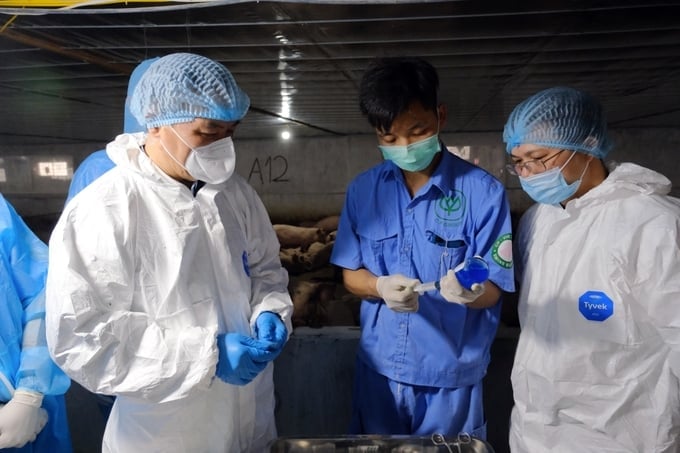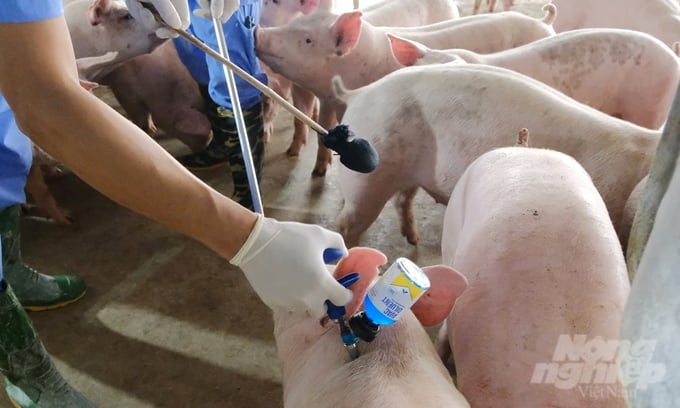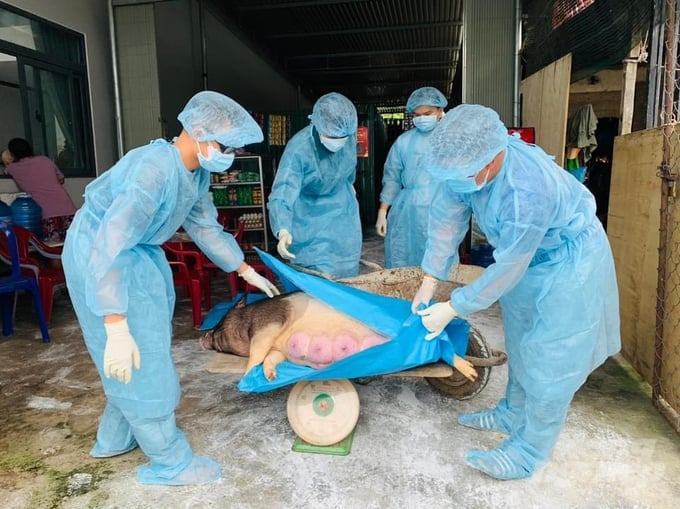May 30, 2025 | 22:21 GMT +7
May 30, 2025 | 22:21 GMT +7
Hotline: 0913.378.918
May 30, 2025 | 22:21 GMT +7
Hotline: 0913.378.918

Deputy Minister of Agriculture and Rural Development Phung Duc Tien (left) and General Director of the Department of Animal Health Nguyen Van Long (right) conducting inspection on the process of African Swine Fever vaccination. Photo: Bao Thang.
American scientists announced the successful research on a non-toxic strain of African Swine Fever virus with the ASF-G-Delta I177L gene segment removed in November 2019. This breakthrough laid an important foundation for vaccine research and production. During the same month, the Ministry of Agriculture and Rural Development delegated representatives from the Department of Animal Health to the United States to collaborate on vaccine research and production.
Official vaccine research and production began in February 2020, with support from American experts. By July 2020, the Ministry of Agriculture and Rural Development authorized the import of the non-toxic gene-cut virus strain for vaccine research and production. Consequently, Vietnamese businesses and animal health agencies have successfully organized the research and production of ASF vaccine.
To date, two vaccines, namely, NAVET-ASFVAC produced by the Navetco National Veterinary Joint Stock Company (Navetco) and AVAC ASF LIVE produced by AVAC Vietnam, have been registered and granted circulation certificates in accordance with the Law on Animal Health. These are the first commercial ASF vaccines to be licensed for circulation, notably in a context wherein no commercial ASF vaccine had been authorized for the prevention of the African Swine Fever on a global scale within the last century.
Accordingly, the Ministry of Agriculture and Rural Development issued a document dated July 24, 2023 to the People's Committees of provinces and centrally governed cities regarding the administration of the ASF vaccine. Additionally, the document called for the organization of widespread vaccination trials across 40 provinces and cities nationwide, yielding positive results.
According to the Department of Animal Health, over 600,000 doses of ASF vaccines have been administered by local farmers and businesses. Additionally, approximately 2 million doses of ASF vaccines have been scheduled for procurement through bidding organized during late 2023 and early 2024.
"However, in comparison with Vietnam's total export of approximately 50 million pigs per year, the number of administered vaccine doses is relatively limited. This challenge requires immediate attention," emphasized Mr. Nguyen Van Long, General Director of the Department of Animal Health.

African Swine Fever vaccination at a suburban livestock facility near Hanoi city. Photo: Bao Thang.
According to Mr. Long, the vaccination progress is limited by the information dissemination and communication efforts for farmers and animal health agencies. Notably, during inspections of disease prevention and control efforts at various facilities, feedback from farmers and animal health officials indicated a lack of awareness with regards to the vaccine. Livestock farmers have exhibited concerns over the vaccine's recent introduction in July 2023, in addition to its relatively new global recognition.
In response to these queries, the Ministry of Agriculture and Rural Development, in coordination with the Department of Animal Health, has directed two vaccine-supplying companies to enhance information dissemination and communication efforts for the vaccine. On the other hand, the Ministry directed the People's Committees of provinces and centrally governed cities to enhance public awareness regarding the ASF vaccine, and assign responsibilities to grassroots animal health agencies.
The Ministry of Agriculture and Rural Development recently advised the Prime Minister to issue Directive No. 29/CT-TTg on preventing the smuggling and illegal transportation of animals and animal products, thereby boosting the efficacy of disease control, and promoting sustainable livestock development to ensure the food supply.
According to the Directive, Provincial People's Committees are requested to focus on directing and prioritizing resource allocation to organize strict, coordinated, and effective measures for preventing and controlling animal diseases, with an emphasis on the African Swine Fever. Accordingly, the increased vaccination of pigs has been highlighted as an urgent solution.
Moreover, the Directive instructs local governmental agencies and People's Committees to establish inspection teams, perform on-site inspections to proactively provide guidance on appropriate response measures, organize timely and effective prevention efforts, and strictly handle violations with regards to animal disease prevention and control, with a focus on ASF vaccination.
In response to the concerns of the livestock farmers, General Director Nguyen Van Long pledges to collaborate with the two ASF vaccine suppliers to organize multiple training, inspection and monitoring activities at the local level, in combination with providing guidance and information on the new vaccine.
Mr. Long emphasized the importance of transparency among stakeholders, with a detailed disclosure of Vietnam's collaborative research efforts with the United States. Additionally, agencies at the grassroots level were informed that following the administration of over 600,000 vaccine doses since July 24, 2023, the vaccinated pig herds exhibited healthy growth. Furthermore, the pigs' immune response rate reached 95%, signalling a high level of safety.
"We need to provide more than just statistics and images to reassure livestock farmers about the safety of this vaccine. The Department of Animal Health will take advantage of every opportunity to promote and provide guidance, including during online meetings. We will prioritize resolving inquiries to provide grassroots officials with a clear direction for implementation," explained Mr. Long.

African Swine Fever has been considered to be the most dangerous epidemic on pig herds, and a common source of concerns among livestock farmers. Photo: Phuong Chi.
Due to its implementation during the second half of the year, which coincides with the finalized local calculations for plans encompassing the procurement, bidding, and administration of vaccines to support livestock farmers, the deployment of the ASF vaccine was delayed. Moreover, the administration of the vaccine failed to meet expectations due to its exclusion from the mandatory vaccination list.
According to Directive No. 29, the Prime Minister explicitly requested local governments to develop and supplement ASF vaccination activities on the pig herds by the end of 2023 and no later than the beginning of 2024.
Additionally, the Ministry of Agriculture and Rural Development has planned to coordinate with international organizations and local governments to guide, support, and promote widespread vaccination, thereby ensuring strict prevention, control, and management of the African Swine Fever.
The World Organization for Animal Health (OIE) plans to delegate experts to Vietnam in January 2024 to inspect and confirm the immune response rate and protection in livestock herds. Mr. Long acknowledged that inviting reputable international organizations and world-leading scientists to conduct on-site assessments in Vietnam is an effective means of communication to the public.
"OIE, as well as the United States and other international partners, are eager to assist Vietnam in developing the vaccine for both sows and breeding pigs. With support from international partners, we can guarantee the widespread administration of this vaccine, instead of focusing on limited target groups of meat and commercial pig, with a relatively short deployment period of three to four months," Mr. Long analyzed.
Vietnam reported 714 cases of African Swine Fever outbreak nationwide across 45 provinces and cities in 2023, necessitating the culling of 34,551 pigs. Accordingly, the number of outbreaks decreased by over 49%, and the number of culled pigs decreased by 48% compared to the same period in 2022. As of mid-March 2023, 110 communes across 25 provinces have not passed 21 days without encountering a new outbreak.
The monitoring of the ASF virus, according to the National Plan for ASF Prevention and Control in 2023, has been deployed in 16 provinces with a total of 930 samples. Namely, 107 samples (11.5%) were returned with a positive result. Notably, the highest positive rates were reported in Lao Cai province at 32%, Dong Nai province at 25%, and Thua Thien Hue province at 20%.
According to the Department of Animal Health, a total of 4.5 million ASF vaccine doses were produced to date. The number of supplied and administered vaccines, following the issuance of the circulation certificate and the Ministry's official letter No. 4870/BNN-TY dated July 24, is over 1.5 million doses. Shortly after being authorized for widespread administration in Vietnam, 300,000 ASF vaccine doses were exported to the Philippines. On the other hand, animal health agencies have assigned personnel to collaborate with international partners in the transfer, consultation, and administration of the new vaccine.
International partners from five countries, including Indonesia, the Philippines, Malaysia, Myanmar, and India, visited Ha Long city, Quang Ninh province to sign procurement contracts for the ASF vaccine on October 22. During the event, Deputy Minister Phung Duc Tien highlighted the importance of the vaccine within the livestock industry domestically and globally. Namely, the vaccine provides a safe health and disease prevention mechanism for the livestock industry, as well as contributes to the establishment of a sustainable food system.
Translated by Nguyen Hai Long

(VAN) Several scientists and farmers are experimenting with soil treatment in some key durian-growing regions such as Cai Lay (Tien Giang), Dak Song, Gia Nghia, and Dak R’lap (Dak Nong).
/2025/05/25/4127-3-073637_820.jpg)
(VAN) Thanks to the promotion from an FAO-implemented project, vegetable production in greenhouses in Moc Chau has seen strong development, from 1.5 hectares in 2021 to nearly 50 hectares in 2024.

(VAN) FAO has recently supported USD 140,000 to implement the project 'Risk mitigation human-animal interface risks through disease control initiatives in pig farming.'

(VAN) The People's Committee of Tra Vinh province has approved an adjustment to the investment policy for the Green Hydrogen Plant project, increasing its area to approximately 52.76 hectares.
![Reducing emissions from rice fields: [2] Farmers’ commitment to the soil](https://t.ex-cdn.com/nongnghiepmoitruong.vn/608w/files/news/2025/05/05/dsc08881jpg-nongnghiep-140632.jpg)
(VAN) Clean rice cultivation model in Thuong Tan commune, Bac Tan Uyen district, is assisting local residents in achieving sustainable agriculture by substantially reducing costs, increasing productivity, and protecting the environment.

(VAN) At the conference to disseminate Resolution No. 68, AgriS introduced its digital agricultural ecosystem and reaffirmed its commitment to accompanying the Government in promoting private sector development and sustainable agriculture.

(VAN) 'Blue Ocean - Blue Foods' initiative is designed to restore marine ecosystems and establish sustainable livelihoods for local communities by cultivating a minimum of 1,000 hectares of cottonii seaweed in the first three years.